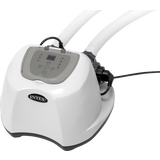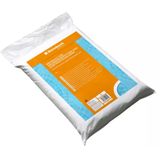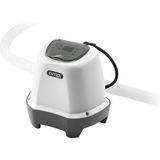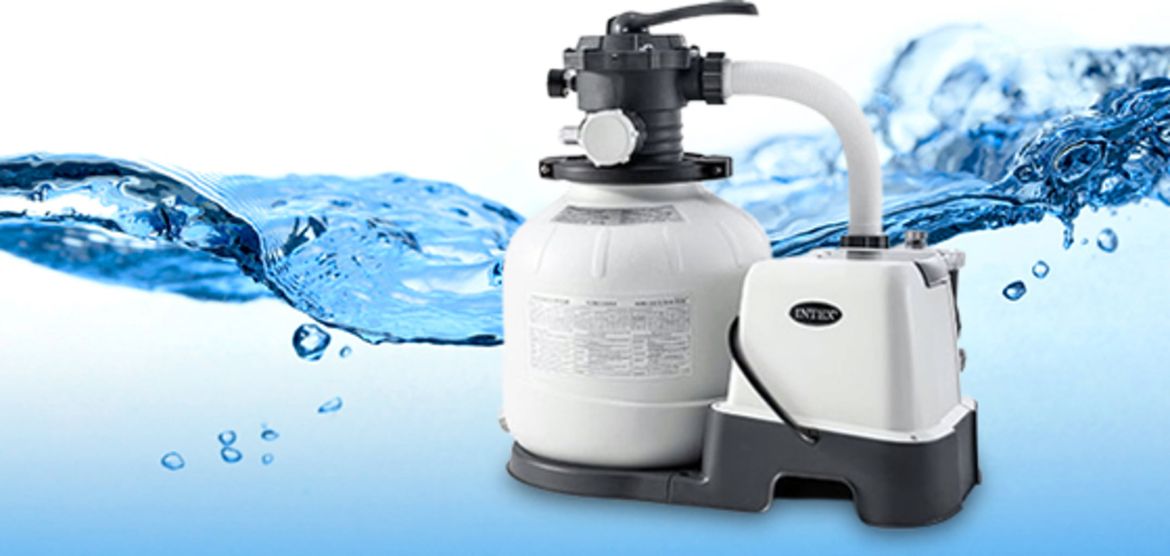Salt Water Systems - Converting Standard Pools to Salt Water Pools
Advantages of a saltwater pool
You've probably had this unpleasant experience after a trip to the local community swimming pool: red, irritated eyes and the typical harsh smell of chlorine. Some people, especially those with allergies, also develop rashes on their skin. You can avoid this by disinfecting your pool without classic disinfecting products that contain chlorine with a saltwater system. The negative effects of disinfection with chlorine will then no longer be an issue. Plus, saltwater systems are less of a burden on the environment because saltwater disinfection is a cyclical process.
How a saltwater system for pool disinfection works
What we have stated above is overly simplistic - let's clarify things a little. There are different types of chlorine. It is important to distinguish between free chlorine and combined chlorine. Free chlorine is the type that disinfects and does not cause any problems in normal settings. Allergic reactions, irritation as well as the notorious chlorine odour come from chlorine breakdown products which are known as chloramines or combined chlorine. Thus free chlorine in normal doses is not the culprit, it is combined chlorine! This point is very important because otherwise, one cannot understand what makes saltwater systems for a pool so interesting.
Salt electrolysis
If salt is present in pool water at a certain concentration (example: Intex: 3 parts per thousand), salt systems can convert sodium chloride (the chemical name of salt) into sodium hypochlorite. Sodium hypochlorite is a type of free chlorine. The advantage of sodium hypochlorite is that it decomposes any chloramines (= combined chlorine) that may be present. And that's exactly why people with sensitive skin or other skin problems are so impressed with it - no undesirable combined chlorine in the pool water! The saltwater itself also feels very pleasant on the skin.
Saltwater system: pool disinfection with salt instead of chlorine
A salt system offers a high-quality alternative to classic chlorine. You can greatly increase the quality of your pool water - because :
- virtually no more combined chlorine in your pool water
- the amount of cyanuric acid no longer increases steadily
In case you're wondering what cyanuric acid is - it is a classic pool chemical added to pools to stabilise chlorine. The problem is that it doesn't break down on its own. The amount of cyanuric acid in your pool builds up steadily over the course of the pool season and, beyond a certain level, it is bad since too much chlorine will get buffered and the effectiveness of the disinfection process decreases. No cyanuric acid gets into your pool with a salt water system - you have to add it manually, giving you full control over the amount that does get in your pool. A small amount of chlorine stabiliser will certainly be helpful since it helps sodium hypochlorite from the saltwater system to work more evenly over a longer period of time. It is also protected from UV radiation in the buffered state and makes the disinfection more even.
How to turn your pool into a saltwater pool?
You will need the following to effectively disinfect your pool water against algae, viruses, bacteria and the like:
- a salt system for salt electrolysis
- salt to make saltwater
- pH reducer or pH raiser
- Pool tester / water tester
- optional: chlorine stabiliser to adjust the CYA value
- optional: test strips for salt content
- depending on the chlorinator model: algae prevention
Which salt system to use
Intex has a large selection on offer. There are differences depending on the model:
- Salt water systems for small pools
- Medium and large salt systems
- Sand filter systems with salt water system
The smaller systems are designed for use with small and medium-sized pools only. Adding an algaecide is essential here. On the other hand, adding an algaecide is not absolutely essential in medium and large stand-alone devices such as the Intex Krystal Clear salt water system (up to 26,500 litres) and salt systems combined with a sand filter system - provided you always keep an eye on your pool water parameters and know how to react correctly in case of problems.
Do not oversize your salt system!
It is important that disinfecting your saltwater is done evenly over a longer period of time. Excessive sudden bursts of sodium hypochlorite production can result in high amounts of free chlorine at the time of application which then reduces several hours later to levels that make it ineffective at disinfection. Use a salt water system that disinfects over several hours evenly. For instance, if your pool has a volume of only 5m³, then the Intex Krystal Clear Saltwater System QS200 would be a much better choice than the more powerful CS3200 model. Even if products with high performance are good in other areas, it does not apply in this case.
Comparison: Amount of active substance by electrolysis depending on the model
- Salt system QS200: 2 g sodium hypochlorite per hour
- Salt system CS3200: 4 g sodium hypochlorite per hour
- Saltwater system 26668 (up to 26,500 L): 5 g per hour
- Saltwater system 26670 (up to 56,800 L): 12 g per hour
- Combination system Krystal Clear 6 m³ : 7 g per hour
- Combination system Krystal Clear 8 m³ : 11 g per hour
Some pool owners use a large chlorinator like the Intex 26670 for small pools. Let's consider a frame pool with 8m³ of water. If this salt system were to run for a long time, you would have an excess of sodium hypochlorite in your saltwater pool. You will be forced to run it for very short periods of time. This is a disadvantage because the water in your saltwater pool should be disinfected evenly over a longer period of time.
Example: An 8m³ pool
For an 8m³ pool, the Intex QS200 will give you the best results. The device can be allowed to run for long periods of time and will ensure that microorganisms in your pool are constantly kept under control. Especially when used in combination with a little chlorine stabiliser. Sometimes less is more!
How to turn your pool water into saltwater
For your salt system to work effectively and to avoid the use of pool chemicals, you must ensure a salt concentration of 3 parts per thousand in your saltwater pool. You can use normal salt or sea salt specially approved for electrolysis. The salt you use should have the following properties:
- very pure (99.5% sodium chloride or more)
- free of additives
- non-iodised, free from dyes
One of the products in our range is Steinbach Sea Salt, available in 25 kg bags. The purity of the salt is 99.6% and is ideal for salt electrolysis.
Adding salt: not too much and not too little
Follow the manufacturer's specifications. For Intex salt systems, the ideal amount of salt is 3 parts per thousand. That's 3 kg of salt per 1,000 litres of water. Try to maintain this concentration at all times because saltwater systems do not work if the salt content is too high or too low. If the salt concentration differs minimally (e.g. 2.8 or 3.2 instead of 3.0 parts per thousand), then your salt system will forgive you - super precision is not required.
3 tips to keep the water in your saltwater pool crystal clear
1) Monitor pH values regularly
We can't stress this point enough: the pH value is the most important parameter of your pool water. Problems can quickly arise if you don't measure the pH value regularly because pH values tend to rise or fall. You can only act if you know what the value is. The pH value of your pool water should be kept between 7.0 to 7.4 failing which the following problems could arise:
- irritation of the skin and mucous membranes
- reduced flocculation performance
- corrosion
- collapse of the disinfection process
Beginners should measure the pH daily and adjust if necessary. Only experienced pool owners should keep the intervals between measurement
2) Keep your saltwater pool covered when not in use
The cleaner the water in the pool, the easier it is to disinfect the pool. In addition to running your pool filter system for longer, we recommend keeping your pool covered when not in use. This ensures that less dirt gets into your pool which lessens the burden on your sand filter system and allows sodium hypochlorite to be more effective because it has to deal with fewer particles. But there are two more important advantages to using a pool cover or dark solar cover:
- lower light levels slow down the growth of algae because they need it for photosynthesis
- it minimises exposure to UV radiation which in turn reduces the loss of large amounts of sodium hypochlorite
3) Pool water in motion = a big plus
Microorganisms love warm pool water that is still. They can explode in numbers if there is not enough sodium hypochlorite or if the pH value is too high. Many saltwater pools have turned into a cloudy microbial soup from one day to the next. Many pool owners use very powerful filter pumps and run them for short periods of time even in midsummer, believing that the high performance of the filter system makes this sufficient. In our experience, this can lead to serious problems. If you keep your water moving, it will slow down the growth of microorganisms. This gives you an additional buffer in case the water values in your saltwater pool start to deteriorate.
Your saltwater pool at Pools.Shop
We have a few complete sets on offer. But you can also put together your own set for a saltwater pool with the help of this guide. We always have attractive offers for you at top prices delivered to your door quickly.
Related products
-
 4.6 (105)
4.6 (105)Intex Krystal Clear Saltwater System QS500
-11%- For pools up to 26.5 m³
- Natural disinfection
- With timer
£159.21 £179.00Delivery by April 29
-
 4.9 (107)
4.9 (107)Steinbach Sea Salt, 25 kg
Bestseller- An alternative to chlorine
- High-quality natural product
- Protects against bacteria
£37.50 (£1.50 / kg)Delivery by April 29
-
 4.0 (1)
4.0 (1)Intex Krystal Clear Saltwater System QS200
-7%- For pools up to 8.3m³
- 3 self-cleaning modes available
- With timer
£76.21 £82.00Delivery by April 29
-
Great Britain: Free standard delivery from £99.90
-
Free
returns -
We operate in a
climate-conscious manner. Secure payments
with SSL encryption technology


